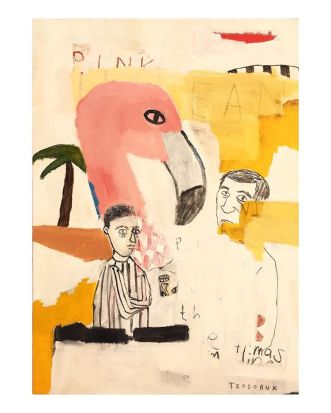We long to bridge the gap between the known and the unknown. Certain combinations of words strung together the right way can produce something so enigmatic, so arcane that they simply must seize our attention, we cannot help but to question their meaning, and fantasise about what truth they could hold. The Chinese have a saying, the title of Sydney artist Brad Teodoruk’s piece above, taps into our desire to know what meaning lies behind a phrase. I sat down with Teodoruk to discuss his work, of which I find fascinating.
Words and images make up the fabric of our understanding of the world, and each word or image has connotations: an additional subjective meaning we derive from a word in our exposure to it, regardless of its original, contextual meaning. While the dictionary provides a concrete, empirical definition of the word; as words go through the process of communication layers of distortion are added, until finally, the word emerges meaning something completely different. Delving into the world of semiotics can shed some light onto this.
To understand this, we’ll start with the concept of a signifier: any word or symbol (a sign, or signifier) that has any meaning associated with it. With such a broad definition, it helps to categorise these signifiers concerning our response to them during exposure: some have very obvious meaning behind them, particularly if they represent real entities (think the Olympic rings). Things get more complicated as people’s idea of the meaning behind a symbol begins to conflict or conflate. In the case of the word “freedom”, we would find a myriad of interpretations all based on the subjective understanding of the concept of freedom. The conceptual space in which these signs exist and interrelate is known as what Lacan called the Symbolic order.
So where in the symbolic order does Teodoruks work sit? A piece as confounding as Pink Chilean (2017) asks a lot of its viewer. It’s impossible to find a logical perception of depth within the image, with incomplete images and concepts running their way around the canvas. How are we able to finish the artist’s sentence without any context?

What we are presented with is the confusion of a world without meaning, of pure thought without direction and the decimation of a relation between things.
Within the symbolic order, meanings shift and dissolve as social relations continually undergo change. This process is known as metonymic sliding, designated by a sliding signifier: a word or sign that over time attains a meaning different to its primal intention. Pop culture gives us an insight into the impact of this: the German film “Er ist Wieder Da” (Look Who’s Back 2015) comedically has us follow a fictional Hitler, back from the dead in contemporary Germany, into a taxi for an awkward cab ride. We see his reaction to the modern contraptions, and then his shock and horror at the rapper on the radio saying the word nigger. We laugh, understanding the current context of the work, and Hitler doesn’t laugh, a sad reminder of the past.
Teodoruk’s methodology is integral in achieving the semantic, conceptual core of his work. He takes words and images from old books, often regarding cricket or rugby, history or war, and in layers, paints them onto the canvas. The key to the ensemble is how it is created: each signifier Teodoruk starts with is obfuscated with confusing additions of colour, line and imagery (often an emotional curve ball will be thrown to disorientate the audience further). The juxtaposition of it all creates the effect of being lost in a labyrinth; we have hit a dead end in the symbolic order.

Take Hooker 2016, what at first glance appears to be a tale of existential despair: we have the muted character, the large primitive red letters spelling out the title of the work (which in itself contains negative connotations to some), and a claustrophobic tar-green background. Teodoruk has you fooled. What you begin to see as an expressionist work of empathy for the downtrodden is turned upside down when we learn that the subject of the painting is appropriated from an old book of rugby, with the subject being the hooker of the team. This work is one in a series of similar works designed to toy with the audience’s engagement with the symbolic order.
What we have here is proof that our perceptions of reality may not always reflect our empirical actuality, and a fun reminder to maintain a certain scepticism towards what (we think) we are seeing. “The Chinese have a saying: I love that phrase. It could mean anything!” Teodoruk offers us an imperative to interpret signs to the best of our abilities but also to relish in the paradox of language: ultimately that a system designed to communicate meaning loses the intended meaning through the communicative process itself.
Brad Teodoruk is an artist practising in Sydney, he has a forthcoming solo exhibition at the Robin Gibson Gallery where he is a residing artist and is a student at the National Art School in Sydney.
You can find more of his work at https://bradteodoruk.com/





